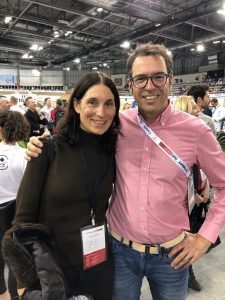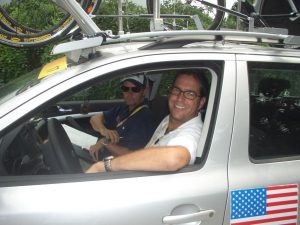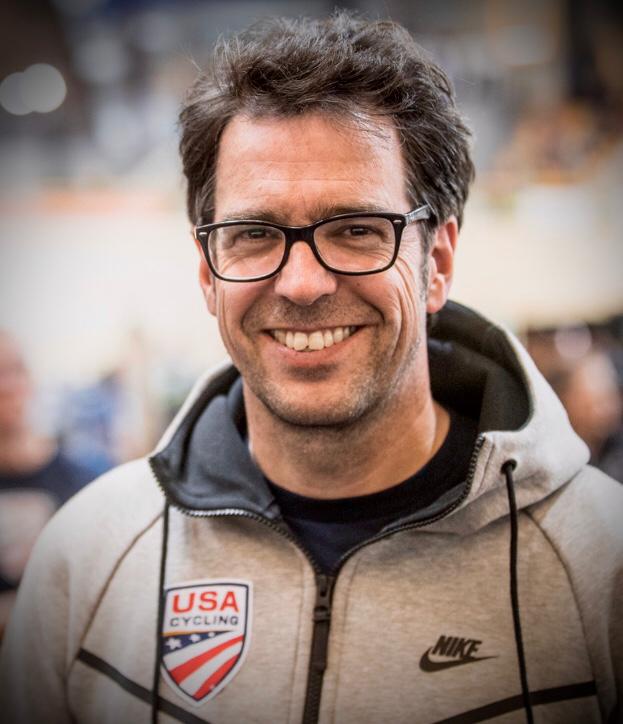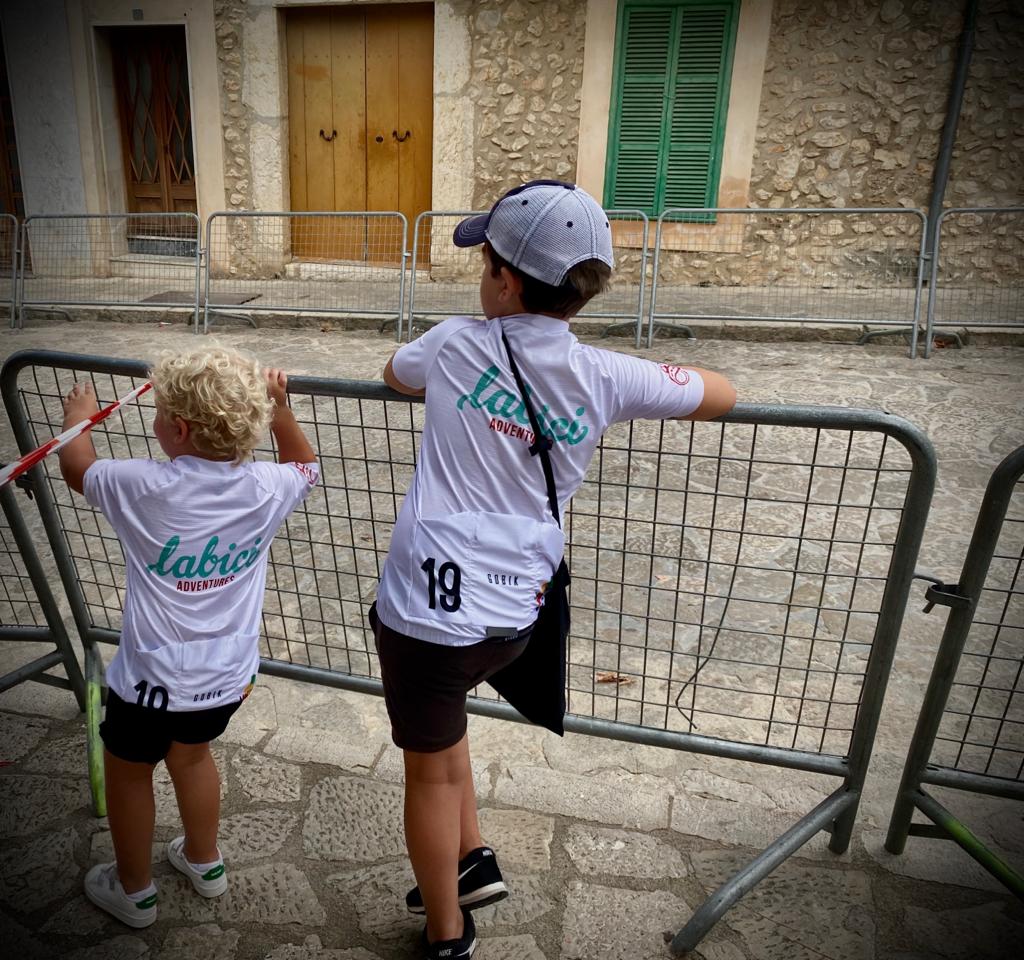A conversation with Ken Whelpdale, Sr. Director of Operations for USA Cycling.
Ken Whelpdale has worked in cycling for 24 years. A native of Toronto, Ken worked as a mechanic and operations manager with various professional cycling teams in the early part of his career before opening his own cycling tourism and team management company La Bici Adventures. Ken resides in Mallorca, Spain and has served as team leader and operations manager for dozens of World Championships as well as numerous Pan American and Olympic Games. He has a unique, insider perspective on professional cycling, the cycling industry, and the development of the sport. On the road, at the races, he always kept us laughing as he joked to keep the mood upbeat, even when the rain was pouring down or the hotel had bed bugs.
Ken, you’ve been in the cycling industry for 24 years. Can you tell us about how you got hooked on the sport? What was your first job in cycling? The reality is I have been in the cycling world for most of my life. The racing bug bit me in the 80´s, as I was introduced to BMX racing. I raced BMX for years until my peers got much bigger and stronger than me. I turned to skateboarding for a few years, before an injury forced my re-acquaintance with the bike. In the early 90´s, while in university, I started mountain biking, touring and then road racing. The first time I experienced a pack of more than 100 riders freewheeling, the buzz hooked me for good! This led me to work in a small boutique bikeshop in Denver, Colorado.
You worked as a mechanic for Team Saturn and USA Cycling in the early 2000s and that was a great period for professional racing in the US. There was a full racing calendar with several marquee events that attracted riders from around the world, swarms of spectators, and, often, a television audience. Women had their own top level events in North America, like the Power Bar Challenge in Idaho, the Montreal World Cup and others that brought many of the best riders in the world. Tell us about that experience and how would you compare that period to road racing in America today? Working for Team Saturn in the early 2000´s was like working for the McLaren of cycling teams at the time. It was a super great opportunity working with some of the best staff in North America and some of the best riders from around the globe. In 2001, Saturn won the World Cup title with the women’s team and it was an amazing honor to be part of that group. The quality of races for both men and women domestically was very high and the races such as the Idaho Women’s Challenge provided a true stage racing opportunity. I rarely make it back to North America these days, but it seems as if the level of racing is very low compared to the late 90´s or early 2000´s.
What do you think it would take to bring road cycling back to that level in America again? That’s the million dollar question.
Ken at the 2004 Olympic Games in Athens with team coach, Jim Miller.
Bike technology has evolved significantly over the last ten years with electric gear systems, internal cables and hoses, and disc brakes. Some of it makes the mechanic’s life easier while other innovations make the bike far more complex and complicated to work on. When I see pro team’s bikes now I often think of all the added hours of work the mechanics must be putting in, changing disc pads, aligning rotors, bleeding brakes etc. What are your thoughts on the new tech? Has it advanced the bicycle and made it a better machine? Will it limit participation and diversity due to increased cost and complexity? In many ways, new tech has made the mechanic´s job easier. For instance, now even World Tour teams are using clincher tires in lieu of tubulars saving mechanics countless hours of preparation. The initial bike set-up is more involved now due to electronics and hydraulic brakes, but once they are set, they are very reliable. Without a doubt the machine is a better racing machine, though on some levels not necessary for the average rider or for every instance. The largest barrier to participation is without a doubt the cost of a competitive machine. Though that said, you can look at the increased numbers of continental African riders in the pro peloton as an example of how supported programs can create a culture of racers.
Ken preparing bikes at the 2004 Olympic Games in Athens, Greece
As a mechanic and team manager, you’ve supported a lot of athletes on their way to winning World Championships, Olympic Games, Grand Tour stages and breaking World Records. Tell me about the greatest highlight of your career? Or maybe it was some of the long road trips in the Team Saturn truck across North America? It has been a great honor to support so many athletes amongst all the cycling disciplines on the world stage. I have never taken for granted the fortune I have to love my job so much.
As a mechanic, I had so many amazing experiences supporting riders in their quest for success. Winning the World Cup with the Saturn Woman´s team is high on that list and your (Dede´s) medal in Athens were very much career highlights.
As a team manager, I take a lot of pride in every success story we are able to contribute to and the best wins have come when we persevered through some level of adversity.
You have worked with many athletes, a lot who are Olympic and World Champions, across all of the different disciplines of cycling. I’m sure there was a wide range of personalities. What are some of the common personality/character traits that you’ve noticed among the cyclists who make it to the top? I would say the singular focus needed to be at the top. Like other professionals, there are those who can do it gracefully and those who struggle a bit more. Early in my career, when working with Clara Hughes, I learned how to be available but invisible before a time trial. It is a skill that I still employ widely today.
When we raced in Europe in the 1990s, USA Cycling’s infrastructure was pretty bare bones: the team had rental vans, we stayed in somewhat dodgy hotels, at US Military bases or even hostels to save money, but it was always a good adventure and made for good memories. We were often fairly isolated, fending for ourselves between races, making our own food, washing our clothes in the sink, etc. I felt like “figuring out life in a foreign place” challenges bonded us as teammates and matured us. But it was tough and probably turned many North Americans away from the sport. More recently, you were a part of setting up USA Cycling’s service course center in Europe, which seems like it’s provided the athletes with really good infrastructure making life easier on the riders and more predictable so they can focus on their performance. The challenges and pressures on the cyclists today are no longer the same–today, they have new and different pressures brought on by social media and are always “connected” and analyzed (power analysis, Strava etc) and riders are retiring young as a result. From the inside, how do you view the pressure shift, culture shift, and how do you feel athletes are dealing with it? When I started in this world we still relied many times on printed manuals and guides. These days we walk around with amazing little computers and very high quality cameras in our hands. The pressure is probably greater because even the smallest race results appear on the web. The micro scope of social media is as well something that impacts the lives of athletes depending on how they manage it. While it helps you keep connected to friends, you have to be so hyper aware of the outward image you project and implications of presenting a political stance in any manner. Along with the advances in physical training, we now spend a great deal on media and mental training to try to help our riders deal with that side of the sport.
Michael, who raced professionally through 2012 (and worked with Kenny while riding for Team Saturn)often talks about a change towards the end of his career: when he roomed with the younger riders on the team, they were often so immersed in their devices that they did not bond with each other as much which eroded the camaraderie and respect within the group. How do you think this all affects the ambiance on teams today, compared to your early years working with teams? For sure the over-use of devices can impact the operation of the team and cohesiveness of the team. The use of social media can create some unwelcome situations within the team, detracting from performances. I think one of the most important aspects to team cohesiveness is to talk during meal times. As a group, we have agreed to not use our phones during lunches or dinners (We have a few team members who are not really morning persons, so we allow phones at the breakfast table). We also build cohesiveness by having some team meetings where we talk about issues and try to learn about each other’s backgrounds by playing “hot-seat.”
In the late 1980s, when I got into cycling, we had hundreds of youth cyclists at the regional races and USA Cycling had a solid development program, which I was fortunate to be a part of. When I raced Junior Worlds in 1989, our team included Lance Armstrong and Bobby Julich, and then, the next year George Hincapie and Freddy Rodriguez were on the team. Many riders from our generation went on to be really successful. But it seemed like by the early 2000s, youth cycling had really dropped off and USA Cycling’s talent pool shrank for many years. Finally there is a huge resurgence in youth development brought on by National development programs like NICA, regional programs like CCAP and USA Cycling has now jumped on the bandwagon with several new youth development initiatives. Do you feel like USA Cycling is starting to reap the benefits of these programs? For sure the impact of NICA is being seen in the most recent group of riders to come from Northern California where Nica is very strong and there are a number of development teams. The main thing is to keep the sport accessible and fun at the Junior level. As well, the youngest riders need great heroes and people they can identify with and emulate.
Cycling is an expensive sport and is a barrier to youth development and diversity. Those barriers seem to get progressively worse each year. How can we overcome this? To me this is one of the greatest challenges that we face as a sport. I feel the most valuable message we can send is to share the freedom of movement that the bicycle can provide. With even the simplest of bikes, you can easily move from A to B on your own accord. This experience of freedom of movement should be commonplace for all persons in the world. Fundamentally, we need to make it safe for kids to use bikes. They will want to race, and we can provide them events and opportunities to do so.
A lot of your energy at the moment is going towards ensuring that all the logistics are dialed for USA Cycling’s athletes and staff at the Tokyo Olympic Games. You’ve worked 5 Olympic Games. Is this the most challenging Olympic Games to plan for? By far Tokyo 2020 has been the most difficult Olympic Games to plan for. In a normal Olympic Games, we have many “known” parameters to base our “optimal” and “B” plans. With Tokyo, we are on the 5th or 6th plan based on ever changing restrictions and Games Playbooks. The most difficult part of the planning is that even in a “normal” Olympic Games, we are forced into operating with less than optimal staffing size, and in Tokyo, we still do not know if or how non-credentialed staff may or may not interact with our athletes and other staff.
Are you confident that Tokyo will be a safe environment for the athletes? What are you doing to ensure that? What are your biggest concerns leading up to Tokyo? I’m sure the Games will be safe for our athletes. Many of our athletes have already taken advantage of schemes that have allowed them to be vaccinated already. Though not required, we would desire a scenario where all staff and athlete team members are vaccinated.
The main way we are ensuring the safety of our athletes is over communication of protocols and strategies that will contribute to their safety.
Concerning to me is if there is a positive case, for instance during our travel into Japan, that impacts our ability to effectively operate. I can’t imagine a medal contender being quarantined and unable to train effectively pre-competition.
You are a Toronto native. What has it been like to return to the city and work at events like the Pan American Games and the World Cup Track Cup races? I always love it! I’m extremely proud to say my roots formed in Toronto. Toronto is a wonderful example of an extremely diverse and accepting multi-cultural center. Everytime I return to Toronto, for events, I take time to visit and enjoy time with family and the great city.
You currently reside in Mallorca – a cycling paradise. What brought you there and why did you choose to settle there? As a cyclist and lover of the outdoors, it was easy to choose Mallorca. We have amazing weather, beaches, caminos in the mountains. I fell in love with Mallorca on my first visit here and on the 3rd visit for the World Track Championships in 2007, I met my wife. I made the leap to Mallorca directly after the Olympic Games in Beijing and I have always felt super fortunate to call Mallorca my home and raise my two boys with my wife and her family. While I was in Milton, 3 years ago, my wife spotted that the perfect house in our village had gone up for sale. We got lucky and were able to make a deal to purchase the house while I was still in Canada. I signed the papers for the purchase agreement the day I arrived back in Mallorca.
Ken hiking in Mallorca with his son.
You clearly love bikes and bike culture. Tell us a bit about your Mallorcan bike tours and what kind of an experience you give to your clients. Also, what level of cyclist are they geared towards? To say I “love” bikes and bike culture is almost an understatement. I continue to exist in the honeymoon state after all these years. Our bike tours are really unique. Though we have some stock, plug and play tours, our typical tour is customized to individual guests or group needs. From the point of contact, we typically follow-up with a phone or Zoom conversation followed by the creation of a custom tour. We look to optimize the specialness of the tours and our culture here by using small boutique hotels, utilizing local resources for cultural visits and always adding an element of surprise into our tours. If I may highlight one aspect of our tours, it would be that due to our local character, we are able to be flexible and amend rides or other elements of the tours due to changes in weather or other conditions without skipping a beat.
On the road in Mallorca
Exploring the gravel in Mallorca
Some of my fondest memories I have of living in Catalonia, Spain, are built around gatherings with friends over meals. Sometimes the simplest meal that is made with fresh local food and shared with friends in the countryside can be one of the best of your life. The culture of food in Mallorca is rich as there is an abundance of local fresh produce, fish etc due to the environment. Do you have a Mallorquin meal or food that stands out? Something you dig into as soon as you get home from a long road trip?
My go-to favorite is Pamb Oli “bread with oil.” The base is a neutral Mallorquin bread, preferably toasted over fire, with Olive Oil (the less filtered the better), tomato (grated on the bread), and cheese from either goats or sheep.
The food in Spain is amazingly simple and fresh. I have too many favorites to list, but the staple of nearly all my daily meals is Olive Oil, made from the olives in the grove just above our town. Meals in Mallorca with friends and family are EVENTS lasting hours at times with many different courses.
The trick here in Mallorca is to eat local. K-0 is not just a hip concept, but an economic concept, as items from outside the island normally carry a substantial import or shipping cost. Most villages host weekly markets and fresh fruits and vegetables can be sourced directly from the farmers. Citrus is abundant and we get oranges from our neighbor´s land, grapefruits and lemons from our families finca.
As for the sea food, it is amazing. My mother in law makes the most amazing paella with seafood and squid ink.
Ken, thank you for sharing your perspective. I am looking forward to biking, hiking and dining with you in Mallorca when the world opens back up and COVID is in our rearview mirror.
Follow Ken Whelpdale at La Bici Adventures. Instagram: @labiciadventures #longmilesbigsmiles #lesscoffeemoreoften











A wonderful interview. Also, gives me ideas about a trip post covid.